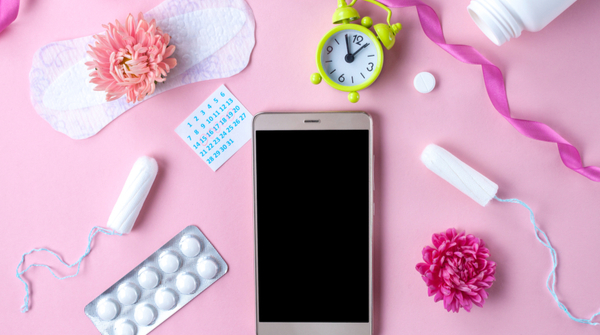The connection between diabetes and menstruation is bidirectional. Diabetes can alter the menstrual cycle in unexpected ways. Similarly, the hormonal changes that occur during the menstrual cycle can impact a person’s diabetes. An irregular menstrual cycle appears to be not only a side effect of diabetes but also a factor in altering blood sugar levels, which means that it’s a vicious cycle.

Menstruation
Estrogen and progesterone levels drop during menstruation. The body sheds the uterine lining via the vagina. In most cases, a menstrual cycle lasts three to seven days. It is the time duration between the first day of one menstrual period and the first day of the next. These cycles can vary from person to person. A menstrual period lasts about 28 days on average, but it can last anywhere from 24 to 38 days.
Diabetes and Menstruation
Diabetes can cause many changes in our bodies. One of the most noticeable changes that women with diabetes may experience is irregular periods. Our periods may make us irritated or depressed, but they also reveal a lot about our overall health.
The impact of different phases of the menstrual cycle on a patient’s blood glucose levels may vary. It’s also possible that the effect differs from person to person and from month to month. Keeping track of blood sugar levels can help a person see patterns in their sugar levels and better regulate their numbers.

It is essential to contact your gynecologist if you have diabetes and have any of the following symptoms:
- Skipping periods for more than three months
- Heavy or prolonged bleeding with passage of clots during periods
- Erratic bleeding in between cycles.
Read More: Diabetes and Pregnancy: Everything You Need to Know
How Can Diabetes Affect Menstrual Cycle?
Diabetics can have an enhanced risk of experiencing abnormal or erratic menstrual cycles.
Type 1 diabetes
Type 1 diabetes should not affect the regularity of menstrual periods or the bulkiness of a person’s cycles. Menstrual irregularities can, however, occur under these conditions. Menstruation can begin at any point throughout puberty, but it usually begins around the age of 12 years. It has been shown in a few studies that people with type 1 diabetes had later initial periods. As long as the individual is not underweight and can control her type 1 diabetes adequately, she should not have any problems starting her cycle.
Type 2 diabetes
Women with diabetes can possibly develop a condition called anovulation. This means that ovulation, the release of an egg from the ovary into the fallopian tube, is not occurring. This phenomenon hinders the process of reproduction in a woman’s body.
Obesity is common in diabetic women, which is a key contributor to hormonal imbalance that leads to anovulation. Women who have diabetes as a result of anovulation may experience fertility issues as well. They are also at risk for anemia, weariness, and a lack of energy, as well as developing uterine cancer later in life. Therefore, they should undertake certain lifestyle changes, such as eating a nutritious diet and exercising regularly, to control blood sugar levels and regularise their menstrual periods in order to avoid these problems.
How to Improve Blood Sugar Levels During Your Period
It can be challenging to figure out when your hormones affect your blood sugars and how to alter your insulin doses to keep your blood sugars in control. And because each woman’s process and reaction may differ significantly, there is no “one-size-fits-all” solution.
To provide advice on how to control diabetes at “that time of the month.”
Hormones and Your Blood Sugar Levels
Estrogen, progesterone, luteinizing hormone, and follicle-stimulating hormone are the four hormones that control your menstrual cycle. Testosterone production plays a role in this as well, albeit only to a minor level.
Because their production levels fluctuate throughout the month, each of these hormones will have a different effect on your blood sugars and insulin sensitivity. Here’s how it breaks down:
Days 1-10
The first day of your cycle begins on the first day of your period. Although some women may have higher blood glucose and insulin resistance on this day, your insulin sensitivity should recover to normal for the rest of your period. The few days following your period are generally insignificant in terms of blood sugar challenges.
Days 11 – 14
The initial part of your cycle, known as the “ovulatory phase,” is when you may observe elevated blood glucose and insulin resistance. The levels of luteinizing hormone, follicle-stimulating hormone, and estrogen, all rise when your body prepares to release an egg, creating a temporary but noticeable surge in blood glucose for 2 to 3 days.
Days 15 – 20
During this part of your cycle, your luteinizing hormone and follicle-stimulating hormone levels drop quickly back to normal levels. Estrogen levels will drop rapidly as well, but as you get closer to the next phase of your cycle, estrogen and, particularly, progesterone levels will begin to rise.
Days 21 – 28
During the 3 to 7 days following up to the start of your next period, you’re most likely to see severe and long-lasting insulin resistance and increased blood sugar.
Estrogen and progesterone levels are at their highest a week before the first day of your menstruation. In a regular 28-day cycle, this would be days 21 through 28.
As these hormones peak in production, your sugar levels become more resistant to your insulin doses. While the rises in progesterone and estrogen are gradual, it may appear that your blood sugar surges rapidly the day before your period comes.
Preparing for Insulin Resistance During Your Period
Don’t let your confusion or frustration get the best of you while your hormone levels are always changing. Balancing your blood sugars around your periods is difficult, especially because not every cycle has the same duration.

Here are a few tips to assist you in managing your blood sugar levels while they fluctuate due to the shifting hormone levels:
Step 1: Track Your Cycle
Tracking your period for three to six months to figure out when you’re ovulating and how long your cycle generally lasts will help you determine if those days of stubbornly high blood glucose are caused by hormones or a sudden inability to count carbs.
This is the ideal place to start if you’ve never examined your menstrual cycle before.
Step 2: Study Your Blood Sugar Pattern
Keep track of your blood sugar levels for two months to build a pattern and determine how much your blood sugar climbs during the two phases of your cycle that cause insulin resistance. Insulin resistance and elevated blood sugar levels are common around the time you ovulate and in the days leading up to the start of your period.
Read More: Diabetic Diet Chart: A Complete Guide to Control Diabetes
Step 3: Adjust Your Insulin Doses With Your Expert’s Help
With the guidance of your certified diabetes educator, try changing your insulin doses after tracking your blood sugar and period for a few months and identifying a pattern.
Most women require an increase in their insulin in the days leading up to their period and around the time they ovulate. Women usually see their fasting blood sugar levels creeping up during these times. Some women may find that they need to increase their mealtime insulin doses slightly.
Bottom line: Before making any significant changes to your insulin doses, it’s important to track for a few months first. Be patient, attempt to spot a pattern, and if all else fails, do your best while keeping in mind that no one manages diabetes flawlessly.




